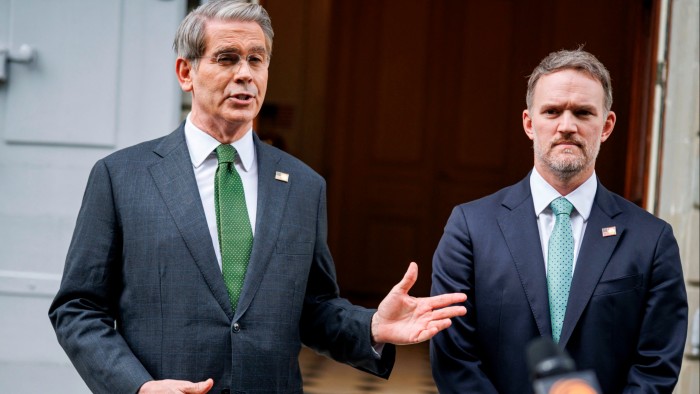Life is too important not to laugh at it

Stay informed with free updates
Simply sign up to the Life & Arts myFT Digest — delivered directly to your inbox.
“You mean they can’t take a joke?” — Donald Trump’s surly response to reporters asking if he had anything to say to the Catholics who might have been offended by the AI-generated image, posted across his various official social media accounts, of the president as the new pope, days before a rather different American was chosen for the job. “You don’t mean the Catholics, you mean the fake news media. The Catholics loved it,” Trump added, before claiming he had “no idea” where the image came from.
The Catholics did not, in fact, love it. “There is nothing clever or funny about this image, Mr. President,” the Catholic Bishops of New York State posted on X. “We just buried our beloved Pope Francis . . . Do not mock us.”
Other things Trump has claimed to have been joking about recently include his promise to end the Ukraine war on day one of his presidency and plans to run for a third term. The White House’s official X account has also posted “jokes” about Kilmar Armando Abrego Garcia, the wrongly deported Salvadoran man whose return Trump is refusing to facilitate, as ordered by the Supreme Court. All hilarious, you’ll agree.
Whether or not Trump is ever amusing is a matter of red-hot contention, as I’ve learnt from the many times I have argued that he is. But the purpose of this latest round of “jokes” is not real amusement; no, this is simply trolling, intended to provoke, to grab attention, and to work out quite how far the president can push his luck. It is certainly not intended to elicit that most delicious release of pent-up tension: genuine, full-bodied laughter.
And we could all probably do with more of that. According to polling by Sky in 2023, we are in the grips of a national “laughter deficit”: 42 per cent of Britons couldn’t remember the last time they laughed out loud, 69 per cent said there was “a lot less to laugh about these days”.
Could that be true? Should that be true? Is it the case that in a world in which we might have never had it so good and yet also have never had it so anxiety-inducing, laughter should be considered inappropriate? Does succumbing to laughter not meet the seriousness of the moment?
For an answer, we might look to one of my favourite aphorisms to (mis)quote, Oscar Wilde’s “life is far too important a thing ever to talk seriously about it.”
Populist politicians use laughter both as a clever way of diffusing tension, and an obfuscation device: a veil under which they can conceal cruelty, authoritarianism or utter chaos and incompetence (or, yes, both). But we must not treat laughter — one of life’s great pleasures, and a rare time we let our guards down and allow our humanity and vulnerability be seen — as the problem. Being keenly aware of the preciousness of life is not incompatible with pointing out its absurdity.
Good comedy has been hard to come by during the past few years of heightened political sensitivity and speech-policing. On TV, there has either been “dark comedy” — more likely to make you want to jump off a cliff than fall off your chair laughing — or saccharine-sweet schmaltz. It is no wonder, then, that a new comedy format — one that is neither deliberately offensive nor performatively politically correct — has proved so popular: watching people endure the exquisite torture that is trying not to laugh. Amazon’s LOL: Last One Laughing has proved a huge global hit: some 28 national versions have been produced to date. When you’re not supposed to laugh the urge becomes irresistible.
In A Cultural History of Laughter, University of Minho researcher Abilio Almeida details the way laughter was repressed and associated with sinfulness and ignorance for almost two millennia in western thought. In the 20th century, Almeida shows how that changed, under the influence of 19th-century thinkers such as Friedrich Nietzsche and Charles Darwin.
We should hold on to that change: humourlessness and pomposity are not always the best antidotes to buffoonery and despotism. Some of the funniest people I know are the most thoughtful. As Almeida puts it: “There’s often a big gap between those who truly think — who usually laugh a lot — and those who merely want to appear thinkers, and for that very reason, rarely laugh.”
We all should know by now how good laughter is for us: it relieves stress, boosts our immune system, alleviates pain and brings us together. As the late Pope Francis wrote in a beautiful essay in December, “When it becomes hard to cry seriously or to laugh passionately, then we really are on the downhill slope. We become anaesthetised, and anaesthetised adults do nothing good for themselves, nor for society”.






